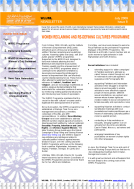WLUML Newsletter 8
| Attachment | Size |
|---|---|
| PDF Document | 2.39 MB |

In this issue, we welcome the launch of the programme “Women reclaiming and re-defining cultures: Asserting rights over body, self, and public spaces”, a joint venture between WLUML and the Institute of Women’s Empowerment (IWE), which brings together women from the Muslim world to examine and discuss how systems of culture, tradition and religion, are used as instruments to legitimize their oppression.
We are also pleased to introduce The “Women Human Rights Defenders International Coalition”, which was formally constituted in November 2008, and comprises various women’s rights and human rights organizations and networks. Women Living Under Muslim Laws (WLUML) sits on the Executive Committee of the WHRD Coalition. In other sections, there is coverage of Afghan women’s street protests against gender discriminatory laws, and a celebration of the success of four female candidates in the recent parliamentary elections in Kuwait. In an interview with WLUML networker, Asma’u Joda, about her work to eliminate child marriage in Nigeria, we learn in greater detail about the harmful effects of child marriage, which is destroying the life opportunities, freedoms, and mental and physical well-being of young girls around the globe. Another WLUML networker, filmmaker Gulnar Tabassum, writes about her experience of making the short documentary, A Small Dream, and her admiration for young, ‘indigenous’ feminist, Humaira Bachal, who with her team of adolescent teachers and students, is fighting to bring change to her Moach Goth community. Moach Goth’s inhabitants are a mixture of people from the remote areas of Balochistan, Sindh, NWFP (North -West Frontier Province), as well as Afghan migrants.
In the essay, ‘Religion, Culture and Politics: Isn’t My Body Mine?’, Coordinator of the international office of WLUML, Fatou Sow, discusses the complex relationship between religion, culture, politics, and women’s position within society, their body and health, arguing that it is necessary to deconstruct the relationship between patriarchal systems in the development of laws that impact upon women.
There are also reviews of three books, including one on fundamentalisms, and a novel set in contemporary Sri Lanka, as well as a review of the 2008 Moroccan film, Number One, directed by Zakia Tahiri. The film looks at how Moroccans are still debating the identity of the Moroccan family five years after the 2004 family code reform.
Happy summer reading!


